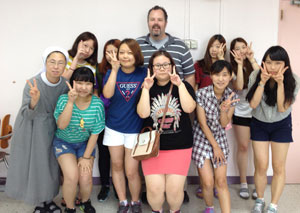By Celine Klosterman

For seminarian Chris Weber, teaching English for a month at a Catholic university in South Korea offered new perspective on culture and the Church.
Soon to begin his second year of pre-theology studies for the Diocese of Davenport, Weber spent July teaching students at Mokpo Catholic University in Mokpo, along the southwest edge of the Asian nation. Each weekday, he spent six hours instructing 15 young adults who hoped to improve their conversational English. He also made cultural outings and visited with seminarians for the Archdiocese of Gwangju.
“It gave me the experience of being a minority — a stranger who doesn’t know the culture or the language,” he said. Simply ordering food at restaurants and communicating with taxi drivers posed challenges. But he expects such experiences will help him empathize with Catholic immigrants when he serves as a priest in southeast Iowa, which includes parishes with Hispanic, Vietnamese and Burmese populations.
Weber traveled to South Korea after the president of Mokpo Catholic University asked for three seminarians from St. Paul Seminary School of Divinity in St. Paul, Minn., where Weber is a student, to teach English this summer. The university’s president, Father Timothy Kim, attended that seminary in the 1970s.
“Not only did I think that it would be good for our students to meet with and learn from seminarians from St. Paul Seminary, but also I thought it would be a good opportunity for the seminarians to experience both Korean culture and the Catholic Church in Korea,” Fr. Kim said.
Intrigued by the opportunity, Weber joined two classmates in traveling to Mokpo. There each man taught some of the 49 students enrolled in a summer program. He said many of the students plan to make a service trip this winter with Missionaries of Charity to the Philippines, where English is one of two official languages.
Classroom time was challenging, he said. The Koreans had studied English for years and could read the language, but needed help with pronunciation and vocabulary.
Weber offered that help with “dedication, enthusiasm, a great sense of humor and a winning personality,” Fr. Kim said. “He was very popular with our students.”
“Getting to know the students was fantastic,” Weber said.
He also spent time with a few seminarians for the archdiocese in a country that is 6.6 percent Catholic, according to the Central Intelligence Agency’s World Factbook. (Half of South Koreans practice no religion; 23 percent are Buddhist, and 20 percent are Protestant.)
Though a minority faith, Catholicism commands respect from Koreans thanks in part to Church leaders’ support of pro-democracy protestors who fought military rule in the 1980s, Weber said. The archdiocese is blessed with more than 200 priests for about 130 parishes.
Korean culture respects celibacy, whether among clergy or people in secular professions, he added.
Unlike in the United States, it’s rare for a Korean to work full-time before entering the seminary, Weber said. Seminarians he met were surprised to hear that before studying to become a priest, he worked for 12 years, including seven years as youth minister at Ss. Mary & Mathias Parish in Muscatine.
One of the highlights of his time overseas was making a pilgrimage to the tomb of St. Andrew Kim Taegon, the first Korean priest, who died in 1846 during persecution of Christians. Pope John Paul II canonized the saint and numerous other Korean martyrs in 1984. It’s easy to think of martyrs as Christians who died during the Roman Empire, but St. Andrew Kim shows they lived more recently, too, Weber noted.
The trip “was an incredible blessing.”







